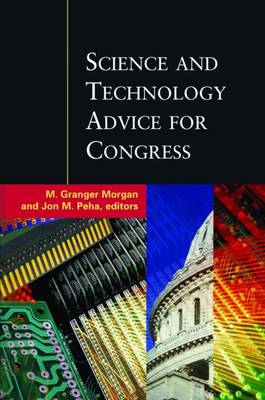
- Afhalen na 1 uur in een winkel met voorraad
- Gratis thuislevering in België vanaf € 30
- Ruim aanbod met 7 miljoen producten
- Afhalen na 1 uur in een winkel met voorraad
- Gratis thuislevering in België vanaf € 30
- Ruim aanbod met 7 miljoen producten
Zoeken
€ 60,95
+ 121 punten
Uitvoering
Omschrijving
The elimination of the Office of Technology Assessment (OTA) in 1995 came during a storm of budget cutting and partisan conflict. Operationally, it left Congress without an institutional arrangement to bring expert scientific and technological advice into the process of legislative decisionmaking. This deficiency has become increasingly critical, as more and more of the decisions faced by Congress and society require judgments based on highly specialized technical information. Offering perspectives from scholars and scientists with diverse academic backgrounds and extensive experience within the policy process, Science and Technology Advice for Congress breaks from the politics of the OTA and its contentious aftermath. Granger Morgan and Jon Peha begin with an overview of the use of technical information in framing policy issues, crafting legislation, and the overall process of governing. They note how, as nonexperts, legislators must make decisions in the face of scientific uncertainty and competing scientific claims from stakeholders. The contributors continue with a discussion of why OTA was created. They draw lessons from OTA's demise, and compare the use of science and technological information in Europe with the United States. The second part of the book responds to requests from congressional leaders for practical solutions. Among the options discussed are expanded functions within existing agencies such as the General Accounting or Congressional Budget Offices; an independent, NGO- administrated analysis group; and a dedicated successor to OTA within Congress. The models emphasize flexibility--and the need to make political feasibility a core component of design.
Specificaties
Betrokkenen
- Auteur(s):
- Uitgeverij:
Inhoud
- Aantal bladzijden:
- 228
- Taal:
- Engels
Eigenschappen
- Productcode (EAN):
- 9781891853746
- Verschijningsdatum:
- 8/09/2003
- Uitvoering:
- Paperback
- Formaat:
- Trade paperback (VS)
- Afmetingen:
- 155 mm x 234 mm
- Gewicht:
- 340 g

Alleen bij Standaard Boekhandel
+ 121 punten op je klantenkaart van Standaard Boekhandel
Beoordelingen
We publiceren alleen reviews die voldoen aan de voorwaarden voor reviews. Bekijk onze voorwaarden voor reviews.








